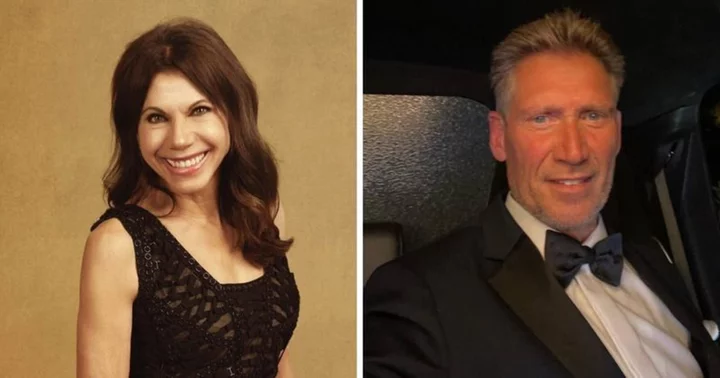Following the announcement of Sinéad O'Connor's death aged 56 Wednesday, her life and music with all their complexities and convulsions have been put back into the spotlight.
The Irish singer was known for her pure and crisp voice, paired with exceptional songwriting abilities that evoked her views on politics, spirituality, history and philosophy, but it was the moment when she tore up a picture of Pope John Paul II on "Saturday Night Live" in October 1992 that has defined public image.
As she reached the end of an acapella version of Bob Marley's "War," O'Connor held up a photo of John Paul II while singing the lyrics, "We have confidence in the victory of good over evil," her crystal-clear voice interrupted only by the sound of paper tearing.
She ripped up the picture, threw the pieces toward the camera, looked straight into its lens and said: "Fight the real enemy," before taking out her earpiece and walking off the stage, the shards of her protest seemingly piercing the silence in the studio.
At first, the act drew widespread condemnation, but in subsequent years this eventually gave way to admiration as the Catholic Church acknowledged and apologized for the sexual abuse perpetrated by members of the clergy, often toward children.
Ahead of her "SNL" appearance, O'Connor had "been pissed off for a few weeks" after "finding brief articles buried in the back pages of Irish newspapers about children who have been ravaged by priests but whose stories are not believed by the police or bishops their parents report it to," she wrote in an extract of her memoir "Rememberings" that was published by Rolling Stone in 2021.
According to popular lore, the "SNL" episode derailed O'Connor's still fledgling career, just two years after she shot to fame with her rendition of the Prince song "Nothing Compares 2 U," which reached number 1 in the United States, received multiple Grammy nominations and produced an iconic music video featuring O'Connor with close-cropped hair and a dark turtleneck.
But O'Connor saw it differently. Ripping up that photo of the pope defined her career in a "beautiful f**king way," she told the Guardian in 2021.
"There was no doubt about who this b**ch is," she said. "There was no more mistaking this woman for a pop star. But it was not derailing; people say, 'Oh you f**ked up your career,' but they're talking about the career they had in mind for me. I f**ked up the house in Antigua that the record company dudes wanted to buy. I f**ked up their career, not mine. It meant that I had to make my living playing live, and I am born for live performance."
Nonetheless, the Anti-Defamation League condemned her, she was booed at a Bob Dylan tribute concert, and stars ridiculed her on SNL sketches in the months afterward.
Joe Pesci hosted the show the following week and in his opening monologue said that O'Connor "was very lucky it wasn't my show. Because if it was my show, I would have gave her such a smack," while the audience applauded.
"I would have grabbed her by her...eyebrows," he added. "I'm making myself crazy, for what, she's just a kid. I mean the Pope's probably forgiven her already."
On another SNL episode, Madonna, echoing O'Connor's words, imitated her by tearing up a photo of Joey Buttafuoco, who had become a common punchline on late-night TV shows after his teenaged lover, Amy Fisher, shot Buttafuoco's wife in the head at close range.
As the years passed, however, the public's stance toward O'Connor softened as sexual abuse by members of the clergy became a matter of record. Nine years after she tore up his photo, Pope John Paul II sent an email apology to the victims of sexual abuse perpetrated by priests and other clergy in Australia and the surrounding region, acknowledging the scandal for the first time in his papacy.
In 2010, Pope Benedict XVI said in an 18-page letter that he was "truly sorry" for the abuse suffered by victims at the hands of Catholic priests in Ireland, O'Connor's home country.
In a tribute to O'Connor following her death, Irish comedian and actress Aisling Bea wrote on Instagram that "everything she stood up for and against then, including racism in the music industry, has been proved to have been needed and right...She was the original truth sayer who wouldn't go easy into the night."
Meanwhile, the former Smiths frontman Morrisey wrote on his website that "she had the courage to speak when everyone else stayed safely silent."









